Ice Age
不知怎么的,我国最近的天气变得较冷。无论黑夜或白昼,温度计总是显示27摄氏度。我原以为只有在温带国家洗澡后才会发颤,如今在新加坡也是如此。希望天气会变得暖和些。难道是我的冷笑话在作怪?
 hours of sleep and rushed to school. After settling all the details and doing a headcount, we headed to the 2nd link in Tuas to board our flight at Senai Airport, Johor Bahru. To lower the travelling costs for our orchestra members, we had chosen budget airline, which meant a lot of moving and travelling about. However, students only had to pay for a total of $430 (Edusave + Subsidy) rather than $700, which was what the other airlines were charging. We were travelling to the city of Kuching, Sarawak on the invitation from Padungan Youth Movement, a youth wing of the political party in Sarawak. Back in 1990s, our orchestra was also invited to Kuching by the same party and held a successful concert there with the strong support of the local Chinese community and the orchestras. This time, I hope to re-establish the ties we have built the last time round and help our members to clock more CIP hours as the proceeds of the performance will be given to the Children's Cancer Association in Kuching. As Keat Hong Chinese Orchestra from Chua Chu Kang Community Club is also travelling with us, we have an impressive combined strength of 100, not counting the 20 local Chinese musicians from Kuching!
hours of sleep and rushed to school. After settling all the details and doing a headcount, we headed to the 2nd link in Tuas to board our flight at Senai Airport, Johor Bahru. To lower the travelling costs for our orchestra members, we had chosen budget airline, which meant a lot of moving and travelling about. However, students only had to pay for a total of $430 (Edusave + Subsidy) rather than $700, which was what the other airlines were charging. We were travelling to the city of Kuching, Sarawak on the invitation from Padungan Youth Movement, a youth wing of the political party in Sarawak. Back in 1990s, our orchestra was also invited to Kuching by the same party and held a successful concert there with the strong support of the local Chinese community and the orchestras. This time, I hope to re-establish the ties we have built the last time round and help our members to clock more CIP hours as the proceeds of the performance will be given to the Children's Cancer Association in Kuching. As Keat Hong Chinese Orchestra from Chua Chu Kang Community Club is also travelling with us, we have an impressive combined strength of 100, not counting the 20 local Chinese musicians from Kuching!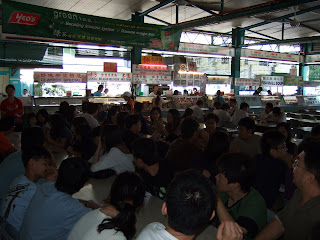 We arrived after 9am in Kuching and were greeted warmly by the local Chinese journalists as it was quite a while since a performance of this scale took place in Kuching. Mr Yong, a former Chinese Orchestra member who participated in the performance on our last visit, is currently managing his father's business and our host this time round. We were brought to a local hawker centre to savour the local delights such as Kuching Mee Siam and Kolo mee (Dried Noodles). I have heard about the noodles early in 2006 when we were planning for the trip and am looking forward to trying out the local delights. For breakfast, I tried the local mee siam and found it to be very different from the Singaporean version. The bee hoon is finer and the gravy more appetising.
We arrived after 9am in Kuching and were greeted warmly by the local Chinese journalists as it was quite a while since a performance of this scale took place in Kuching. Mr Yong, a former Chinese Orchestra member who participated in the performance on our last visit, is currently managing his father's business and our host this time round. We were brought to a local hawker centre to savour the local delights such as Kuching Mee Siam and Kolo mee (Dried Noodles). I have heard about the noodles early in 2006 when we were planning for the trip and am looking forward to trying out the local delights. For breakfast, I tried the local mee siam and found it to be very different from the Singaporean version. The bee hoon is finer and the gravy more appetising. 
 After a brief lunch, we proceeded to the Kuching Museum located just beside our hotel. The tour guide gave us an introduction to the original lifestyle of the aborigines. The locals lived in longhouses built from wood and lead simple lives. The instruments used by the locals are somewhat similar to our instruments in that they were either string or woodwind instruments, differing only slightly in design and sound produced.
After a brief lunch, we proceeded to the Kuching Museum located just beside our hotel. The tour guide gave us an introduction to the original lifestyle of the aborigines. The locals lived in longhouses built from wood and lead simple lives. The instruments used by the locals are somewhat similar to our instruments in that they were either string or woodwind instruments, differing only slightly in design and sound produced. After the short tour, we began sorting out the instruments to be used for the concert. It seemed that after many years of disuse, some of the instruments of the local orchestra needed much repair. It turned out that the supplies we brought for ourselves were mainly used to repair their instruments! Rehearsal began proper once we sorted out the problems and members of all 3 orchestras had little time to adjust themselves to the new environment and each other. We managed to clear all the pieces by 10pm and retired for the night.
After the short tour, we began sorting out the instruments to be used for the concert. It seemed that after many years of disuse, some of the instruments of the local orchestra needed much repair. It turned out that the supplies we brought for ourselves were mainly used to repair their instruments! Rehearsal began proper once we sorted out the problems and members of all 3 orchestras had little time to adjust themselves to the new environment and each other. We managed to clear all the pieces by 10pm and retired for the night. Despite the long day yesterday, most of the members woke up on time to maximise their shopping time. We walked from our hotel to the riverside where the local bazaar and shopping malls were located. Most of the girls went to the malls to look for good bargains in the fashion boutiques while Mrs Lim, some of the sec 3 seniors and I headed to the local bazaar to look for local produce. The weather was fine and the mood was just right, except that when asked to take photos, our sec 3 seniors were very reluctant. I believe they would be more comfortable in a neoprint squeezing each other than appearing "normal" in an arranged shot.
Despite the long day yesterday, most of the members woke up on time to maximise their shopping time. We walked from our hotel to the riverside where the local bazaar and shopping malls were located. Most of the girls went to the malls to look for good bargains in the fashion boutiques while Mrs Lim, some of the sec 3 seniors and I headed to the local bazaar to look for local produce. The weather was fine and the mood was just right, except that when asked to take photos, our sec 3 seniors were very reluctant. I believe they would be more comfortable in a neoprint squeezing each other than appearing "normal" in an arranged shot. 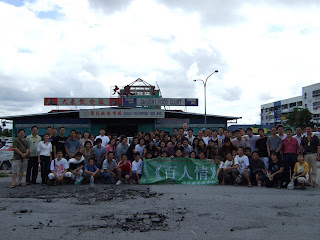 After lunch, we had a short break and proceeded to the performance venue to make the final preparations for the evening. All the muscians on stage were pretty relaxed just before the concert, which was pretty good given that quite a lot of members had no public performance experience prior to this concert.
After lunch, we had a short break and proceeded to the performance venue to make the final preparations for the evening. All the muscians on stage were pretty relaxed just before the concert, which was pretty good given that quite a lot of members had no public performance experience prior to this concert. 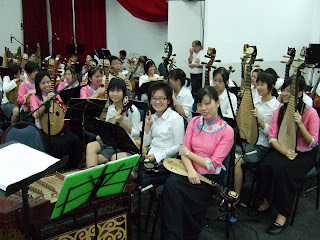 This public performance will be a very good exposure and experience for our orchestra as they will get to exhange pointers with other musicians and improve on their skills and prepare themselves mentally for SYF Central Judging 2007. From the ticket sales, it was evident that the concert had the strong support of the local Chinese community as it was full house that night. The concert started off with an introduction of the Children's Cancer Association and the usual speeches of the host, followed by an opening ceremony with representatives of all the organisations involved.
This public performance will be a very good exposure and experience for our orchestra as they will get to exhange pointers with other musicians and improve on their skills and prepare themselves mentally for SYF Central Judging 2007. From the ticket sales, it was evident that the concert had the strong support of the local Chinese community as it was full house that night. The concert started off with an introduction of the Children's Cancer Association and the usual speeches of the host, followed by an opening ceremony with representatives of all the organisations involved. 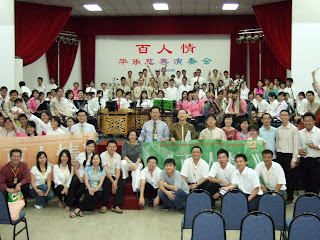
 We woke up after a good sleep and proceeded to a local wet market for a tour. We then visited the pitcher plant and orchid garden of Kuching. It was pretty interesting to look at the pitcher plants as they are mainly found in Malaysia. Singapore's Botanical Garden does have a few species but Malaysia has more. Appearing in various sizes, shapes and colours, the pitcher plants have 1 primary function: to attract insects to drop into the digestive liquids found at the bottom of the "pitcher" and digest them. This is the way the plants obtain precious nutrients in nutrient-poor soil. As it was not the blooming season for the orchids, we were unable to see most of the orchid flowers.
We woke up after a good sleep and proceeded to a local wet market for a tour. We then visited the pitcher plant and orchid garden of Kuching. It was pretty interesting to look at the pitcher plants as they are mainly found in Malaysia. Singapore's Botanical Garden does have a few species but Malaysia has more. Appearing in various sizes, shapes and colours, the pitcher plants have 1 primary function: to attract insects to drop into the digestive liquids found at the bottom of the "pitcher" and digest them. This is the way the plants obtain precious nutrients in nutrient-poor soil. As it was not the blooming season for the orchids, we were unable to see most of the orchid flowers. 





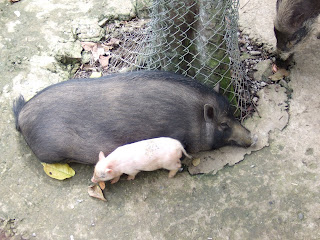
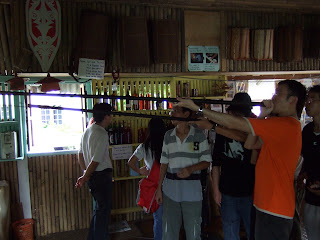
Our last night in Kuching was spent at a seafood hawker centre located on the rooftop of a building. In appreciation of our efforts, Mr Yong and his party treated us to a seafood dinner. The dish which left a lasting impression on me was the Kuching version of the oyster omelette. In Singapore, we fried the oyster with beaten eggs and cornflour mixture to form a paste-like omelette. In Kuching, they had the oysters in beaten eggs, adding only a little conflour mixture to create a crispy thin layer. A special sauce was provided for additional flavouring. According to Mr Yong, they could also fry our Singapore version, but the locals prefer their version. I must say it was very savoury and made me look forward to tasting it again in future.
4th Dec
After some late night packing the previous night, the orchestra managed to wake up in time and send all instruments and luggages up onto the coaches. After some farewells at the airport, we head straight back to Senai Airport and entered Singapore through the 2nd link again.
.jpg)
.jpg)
.JPG) We visited the Ming wall the next morning. It was chilly and windy, and my nose was runny for a brief while. We viewed the siege machines used to defend or attack a city, and were left to tour the city walls. While sight-seeing, the hawkers there flew a string of kites to attract our attention, and I went to try it out. The constant breeze and the small size made it easy to fly the kites, and it was quite a satisfaction after missing out on kite-flying for a couple of years.
We visited the Ming wall the next morning. It was chilly and windy, and my nose was runny for a brief while. We viewed the siege machines used to defend or attack a city, and were left to tour the city walls. While sight-seeing, the hawkers there flew a string of kites to attract our attention, and I went to try it out. The constant breeze and the small size made it easy to fly the kites, and it was quite a satisfaction after missing out on kite-flying for a couple of years. .JPG)
.JPG)
.JPG)
.jpg)
.jpg)
.jpg)
.JPG)
.jpg)
.jpg)
.jpg)
.JPG) Too bad some parts of the temple were destroyed in a major fire and the temple buildings we see today were built after the 1980s. Now if only the scriptures containing the best skills were kept in the scriptorium, I would dress myself in black and enter the temple grounds after nightfall to steal the manuals. As we were touring the various parts of the temple, the sky began to darken and it started drizzling when we were midway through Shaolin. As such, we had to hasten our tour of Shaolin temple and proceed on to the forest of pagodas behind Shaolin temple.
Too bad some parts of the temple were destroyed in a major fire and the temple buildings we see today were built after the 1980s. Now if only the scriptures containing the best skills were kept in the scriptorium, I would dress myself in black and enter the temple grounds after nightfall to steal the manuals. As we were touring the various parts of the temple, the sky began to darken and it started drizzling when we were midway through Shaolin. As such, we had to hasten our tour of Shaolin temple and proceed on to the forest of pagodas behind Shaolin temple. .JPG) Placed in the pagodas are the relics of all the abbots of Shaolin temple. By the time we ended our tour of the pagodas, the sky was already quite dark and we had to leave the temple grounds by taking the local scooter-like vehicles to transfer to our coach.
Placed in the pagodas are the relics of all the abbots of Shaolin temple. By the time we ended our tour of the pagodas, the sky was already quite dark and we had to leave the temple grounds by taking the local scooter-like vehicles to transfer to our coach.  We continue travelling deeper into Henan Province, and arrive in Xingyang to visit the middle school (the equivalent of a secondary school in mainland China), 荥阳三中. Although the driver and tour guide had some problems locating the school, we managed to reach it in the end and were greeted warmly by the Principals, staff and students of the school. After some brief introduction by the Principal, the students got to mingle around. Thereafter, our group was lead around the school grounds for a tour of the facilities. Being a rather prestigious school in Xingyang, Xingyang San Zhong was quite large and had the basic facilities of a normal Chinese school.
We continue travelling deeper into Henan Province, and arrive in Xingyang to visit the middle school (the equivalent of a secondary school in mainland China), 荥阳三中. Although the driver and tour guide had some problems locating the school, we managed to reach it in the end and were greeted warmly by the Principals, staff and students of the school. After some brief introduction by the Principal, the students got to mingle around. Thereafter, our group was lead around the school grounds for a tour of the facilities. Being a rather prestigious school in Xingyang, Xingyang San Zhong was quite large and had the basic facilities of a normal Chinese school. 
What is more remarkable (but not noticed by most of our students) is that Chinese students had a high level of discipline, because when we were stomping up the stairs, there was no noise at any level, all these despite the fact that there are about 52 students in each class! In China, the students travel around the school quietly and orderly, and listened attentively during lessons. During physical training, you can hear the students shouting cheers very clearly across the running track. Given the same scenario, our Singapore students will rather walk when the teacher is not hard on them. Also, when called upon to perform or do public speaking, Chinese students definitely had the confidence and discipline to discharge the task. On the other hand, our students back in Singapore will either give all sorts of excuses or refuse to speak up in front of their own class, much less in front of foreign visitors. Obviously, we have to do more to ensure that our students can present themselves well, and that they do not choose to do it or not. Some might say I am adopting too harsh a stand, but I think we must prepare our students for future challenges ahead

After the tour, both sides put up simple performances as a gesture of cultural exchange. The Chinese students sang their school song and a translated version of Zhang Xueyou's Farewell 《吻别》 while our students prepared 3 songs and a skit. 

After spending an hour and a half in Xingyang San Zhong, we had a brief exchange of gifts and had a photo-taking session in front of the school. Before we left, our students also presented the Chinese students with simple gifts as a token of appreciation for their hospitality. Needless to say, the students exchange emails and left quite an impression on the Chinese students, particularly since our group was mainly girls and they had quite a number of boys.